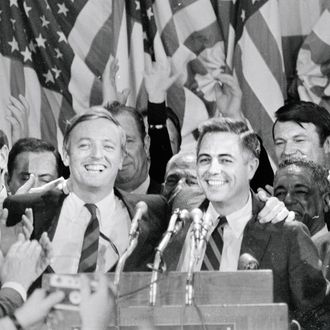
Conservative pundit William Kristol was undoubtedly trying to avoid ridicule at his unveiling of fellow conservative pundit David French as the long-awaited savior of Republican honor via an independent run against Donald Trump when he tossed out this precedent:
>When reached by text message, Kristol compared French’s possible bid to “Jim Buckley 1970,” a reference to the surprising victory in New York’s 1970 Senate race by Conservative Party candidate James Buckley, the brother of William F. Buckley, who founded National Review magazine.
Decades later, James Buckley’s insurgency remains fondly remembered by activists on the right as one of the rare instances where a hard-line conservative candidate, operating outside of the Republican Party, won a federal contest.
That’s true. Buckley’s narrow victory in a three-way race against Republican senator Charles Goodell and Democrat representative Richard Ottinger was a conservative-movement triumph of the first order. But truth is Buckley ’70 is not an appropriate precedent at all for French or any other last-second “conservative alternative” candidate, for five reasons:
1. Buckley had a preexisting ballot line and an actual party behind him. The Conservative Party of New York won a statewide ballot line shortly after its founding in 1962. It was intended to take advantage of New York’s unusual “fusion” system allowing multiple party ballot lines for candidates. More specifically, it was intended to counter the Liberal Party’s influence on Republicans, whose candidates often sought and received that party’s imprimatur. By 1970 the Conservative Party was a familiar part of the Empire State political landscape, and considered a benevolent force by a lot of conservative Republicans who did not necessarily vote for its non-GOP candidates. Contrast that with the situation facing French or any other hypothetical independent conservative anti-Trump presidential candidate, who would spend most of his or her time seeking ballot access and basic legitimacy.
2. Buckley’s Republican opponent was an appointed senator who made a point of voting with Democrats. Moderate Republican congressman Charles Goodell was appointed by conservative bête noire Nelson Rockefeller to the seat occupied by Robert F. Kennedy upon RFK’s assassination in 1968. Goodell’s voting record in the Senate veered well to the left, and included outspoken opposition to President Richard Nixon’s Vietnam policies, and votes against two Nixon Supreme Court nominations. It became obvious early on that Goodell’s strategy for reelection was to secure the Liberal ballot line and expect Republicans to loyally support him regardless of his ideological positioning (a strategy followed by Senator Jacob Javits and many others). He basically invited a strong Conservative Party challenge. No matter how much conservatives try to pretend Donald Trump is a “liberal,” there’s no denying he has a visceral connection with the conservative Republican rank and file that was entirely lacking in Goodell’s case.
3. Buckley enjoyed thinly veiled support from a Republican White House. The Nixon White House did not take Goodell’s sudden liberalism lying down. While Nixon himself stayed out of the race, his vice-president, Spiro Agnew, then the hero of virtually all conservative Republicans, dropped increasingly clear hints that voting against Goodell was kosher. There’s nothing like this sort of validator behind French or any other potential Trump challenger, unless you think Bill Kristol himself confers instant legitimacy. (That is a joke!)
4. The Democratic and Republican nominees in 1970 sounded very much alike. Playing directly into Buckley’s strategy, Goodell fought Ottinger for votes on the left end of the political spectrum. Buckley’s slogan — “Isn’t it time we had a U.S. senator?” — appealed to a sense of conservative (and, to some extent, Catholic ethnic) disenfranchisement by two parties that had rigged the system to offer very limited choices. Contrast that with the bitter partisan polarization already characterizing the Clinton-Trump contest. Only the most fatuous ideologue (from either end of the spectrum) would claim Clinton and Trump sound just alike.
5. Buckley had high — albeit borrowed — name ID. James Buckley was not all that well known in 1970, though he had run statewide as the Conservative Party challenger to Jacob Javits two years earlier. But his brother, William F. Buckley, was an exceptionally well known conservative magazine editor, television personality, and, in 1965, the Conservative Party candidate for mayor of New York. It’s probably fair to say WFB got as much media attention in 1965 as either of the major-party candidates who ran far ahead of him in the election.
Sources
WPAll in all, the Buckley analogy may be the best the conservative #NeverTrump bitter-enders can do. But like so many things asserted by William Kristol, it just ain’t right.






























